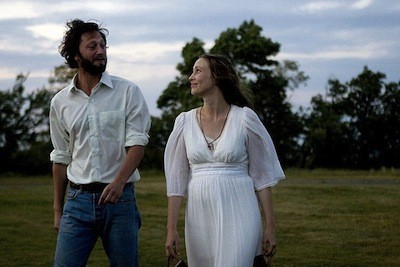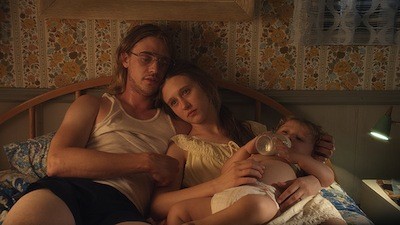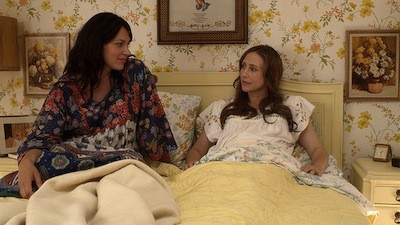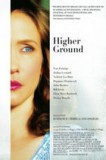| Reviews & Columns |
|
Reviews DVD TV on DVD Blu-ray 4K UHD International DVDs In Theaters Reviews by Studio Video Games Features Collector Series DVDs Easter Egg Database Interviews DVD Talk Radio Feature Articles Columns Anime Talk DVD Savant Horror DVDs The M.O.D. Squad Art House HD Talk Silent DVD
|
DVD Talk Forum |
|
|
| Resources |
|
DVD Price Search Customer Service #'s RCE Info Links |
|
Columns
|
|
|
Higher Ground

If there is one thing that Vera Farmiga's directorial debut Higher Ground succeeds at, it's renewing my lifelong commitment to be an unmarried degenerate. Seriously, this true-to-life drama about marital strife and wrestling with faith is a bit of a downer. Hollow out your Bible, put your engagement ring inside, and throw both of them in the river.
Which I don't think was Farmiga's intention, so I hope she'll forgive my facetious intro. In all seriousness, the Up in the Air actress has chosen some challenging material for her first time on both sides of the camera. Higher Ground is an adaptation of a memoir by Carolyn S. Briggs, who worked on the screenplay with Tim Metcalfe (The Haunting in Connecticut, Kalifornia). The final product has both the sincerity and the nostalgia of most diaries, capturing a level of truth but tainting it with the soapy operatics of memory. How it affects you will likely depend on your relationship with either half of this storytelling equation.
Farmiga stars as Corrine, a married mother of three in the American heartland, though the story begins when Corrine is a little girl in the 1950s. She is played as a child by first-timer McKenzie Turner and as a teenager by the star's little sister, Taissa Farmiga, thus explaining the uncanny resemblance. The family casting is solid throughout. I can buy Donna Murphy as her mom, and John Hawkes is both earthy and dangerous, traits he has employed so well in his roles on Deadwood and in Winter's Bone, as her father. The fact that Corrine is a dreamer is established early, and her initial steps into religion seem more like a kid going along, maybe even pulling a prank, than anything meaningful. In high school, she starts dating Ethan, a local rock musician (first Boyd Holbrook, then Humpday's Joshua Leonard as an adult). Pregnancy leads to marriage, and then a changed lifestyle and a nearly fatal car accident leads to a normal, settled life with regular church on Sundays.
Only, the dreamer can't stop dreaming, and Corrine is restless. It's hard to tell if thing are helped or made worse by her friend Annika (Dagmara Dominczyk, Running with Scissors), a light-hearted Polish immigrant who doesn't see a good Christian life as having to be void of good sex. In fact, the hippy dippy church that Corrine and Ethan attend encourages fervent conjugal behavior. Still, there are plenty of sharp curves ahead for Corrine, and each one will distance her further from her beliefs.

There is always a balancing act that has to be performed if one wants to depict religion with any critical fairness. It's easy to caricature a person of faith--trust me, I grew up in this kind of environment--and draw simple dividing lines between a religious lifestyle and a "secular" existence. In some ways, Briggs' story plays like a teenage girl's fantasy of what growing up ought to be like: she'll date a boy in a band, she'll be the pretty one in her church group, she'll meet a dreamy Irish postman who hits on her, etc. It's tough to avoid cliché with these kinds of story details, and Farmiga mostly makes it believable. The writing gingerly deals with complicated issues like the latent sexism in the church--an important socio-political factor in the 1970s--but thankfully avoids speechifying. Farmiga has more trouble with the literary pretensions. Repeated images and phrases push too hard for metaphor and closure (the accordion, the dogs, the spoken portents), and while I guess you can blame the meaningful coincidences on divine providence, they tend to feel contrived.
As with many actors turned directors, Farmiga seems most comfortable in giving her collaborators a generous space in which to do their work. The ensemble is solid as a rock. Domicyzk is funny and heartbreaking, and Leonard brings empathy to a guy that, frankly, most of us aren't going to like. While Farmiga's own role isn't the juiciest, it is the most central. Once Corrine comes of age, she is in almost every scene, and she carries the burden well. One of the intriguing things about the script is how it lets us into Corrine's thought processes, verbalizing her wrestling with her devotion via prayers that also act as a kind of running monologue. Her fantasies come quickly, appearing for her--and us--as honest reactions at inappropriate times. These devices allow us to understand why she wishes to stay the course and why it doesn't satisfy her in equal measure.
Which could be the fatal flaw of Higher Ground. At times, Vera Farmiga plays it too nice. I didn't always know where the film was coming from, I just kne whatever was going on was emotionally draining. A few years back, Farmiga starred in a little-seen indie called Never Forever. It ended on an ambiguous note, leaving much of what happened next up to the viewer. While this can work when guided by a confident artist, one of the most common Google searches leading to my review is a variation on the phrase "What happened at the end of Never Forever?" I'm afraid Higher Ground's finale lacks a similar clarity. There are a few smoke signals we can interpret, but it might have been a good time for Corrine to take a stance one way or another. Maybe she hadn't figured it out by the end of the period in her life depicted here, but I'm sure Carolyn S. Briggs has figured it out since. The truth she has learned, and has since decided to share, loses some of its poignancy if Corrine's future isn't her own, but rather, is whatever we choose to believe it will be.

Jamie S. Rich is a novelist and comic book writer. He is best known for his collaborations with Joelle Jones, including the hardboiled crime comic book You Have Killed Me, the challenging romance 12 Reasons Why I Love Her, and the 2007 prose novel Have You Seen the Horizon Lately?, for which Jones did the cover. All three were published by Oni Press. His most recent projects include the futuristic romance A Boy and a Girl with Natalie Nourigat; Archer Coe and the Thousand Natural Shocks, a loopy crime tale drawn by Dan Christensen; and the horror miniseries Madame Frankenstein, a collaboration with Megan Levens. Follow Rich's blog at Confessions123.com.
|
| Popular Reviews |
| Sponsored Links |
|
|
| Sponsored Links |
|
|
| Release List | Reviews | Shop | Newsletter | Forum | DVD Giveaways | Blu-Ray | Advertise |
|
Copyright 2024 DVDTalk.com All Rights Reserved. Legal Info, Privacy Policy, Terms of Use,
Manage Preferences,
Your Privacy Choices | |||||||











